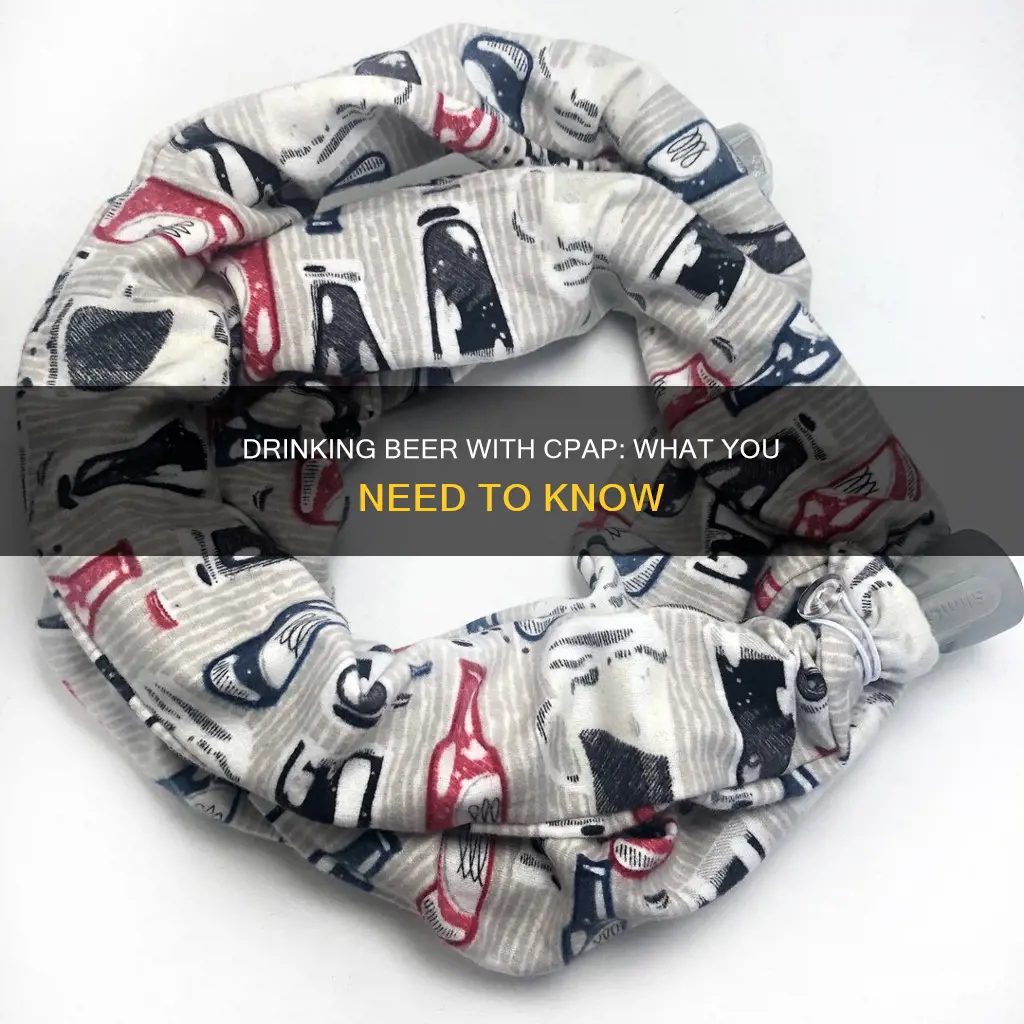
Drinking alcohol is a common practice, with about 55% of American adults reporting having had a drink in the last month. While alcohol use near bedtime can promote drowsiness, it often results in fragmented, lower-quality sleep. Alcohol can also negatively impact sleep in several other ways, including disrupting the brain's normal electrical activity during sleep, altering sleep cycles, and reducing REM sleep.
Alcohol can also contribute to sleep apnea, a condition marked by repeated breathing disruptions during sleep. Alcohol can affect people with both types of sleep apnea, known as obstructive sleep apnea (OSA) and central sleep apnea (CSA). OSA occurs when soft tissues in the back of the throat collapse, causing airway blockages while you sleep. CSA arises when the brain fails to send the proper signals to the muscles that control breathing.
Alcohol can worsen OSA by relaxing the muscles in the airway, increasing the time between when you stop breathing and wake up to breathe again, and causing nasal congestion. It can worsen CSA by slowing down the central nervous system and causing more frequent apnea episodes.
If you have sleep apnea, your healthcare provider will likely suggest limiting your alcohol intake. However, if you choose to drink, it is crucial to maintain your continuous positive airway pressure (CPAP) therapy routine. Research suggests that CPAP therapy can still effectively manage sleep apnea, even if you consume alcohol.
| Characteristics | Values |
|---|---|
| Effect of alcohol on sleep | Alcohol can disrupt REM sleep, causing people to miss several REM cycles and feel sleep-deprived the next day. |
| Effect of alcohol on sleep apnea | Alcohol can increase the frequency and duration of apnea events, lower oxygen levels in the blood, and worsen sleep apnea symptoms. |
| Effect of alcohol on CPAP therapy | CPAP therapy can still effectively manage sleep apnea, even if the patient consumes alcohol. However, it is recommended to limit alcohol intake and maintain CPAP therapy routines. |
What You'll Learn

Drinking alcohol can cause snoring
Drinking alcohol can have a significant impact on snoring and sleep quality, even for those without sleep apnea. Alcohol is a depressant, which causes the muscles in your throat and mouth to relax. This includes the epiglottis, the flap of cartilage that acts as a gateway between your throat and mouth. When drinking alcohol, the epiglottis may become restricted, and your nasal passages may become swollen, creating airflow restrictions. As a result, the body forces you to breathe in more deeply, creating vibrations across the skin in your oesophagus that translate into snoring.
The amount of alcohol consumed and the time at which it is consumed also influence whether or not you will snore. Even a small amount of alcohol can impact your sleep and cause snoring. Low amounts—less than two drinks for men and less than one for women—can decrease sleep quality by 8.3%. Moderate drinking (two drinks for men and one for women) can reduce quality by 24%. High amounts (more than two drinks for men and more than one for women) can decrease quality by 39.2%. It is recommended to stop drinking alcohol about four hours before bedtime to reduce the impact on sleep quality.
Alcohol doesn't just cause snoring; it can also trigger more serious sleep issues like sleep apnea. Drinking alcohol can increase the frequency and severity of sleep apnea episodes by lowering oxygen levels in the blood and causing muscle relaxation, leading to airway obstructions during sleep. Alcohol can also cause nasal congestion, making obstructive sleep apnea more likely.
While alcohol consumption can negatively impact sleep quality and increase snoring and sleep apnea episodes, continuous positive airway pressure (CPAP) therapy can still effectively manage these conditions. If you require a CPAP machine, your healthcare provider will likely suggest limiting your alcohol intake. However, if you choose to drink, it is crucial to maintain your CPAP therapy routine. So far, there is no evidence that alcohol makes CPAP therapy less effective.
Drinking Beer on Shinkansen: What You Need to Know
You may want to see also

Alcohol can disrupt REM sleep
Secondly, alcohol interferes with the brain's ability to regulate breathing during sleep, particularly in people with sleep apnea. Alcohol causes the brain to become less sensitive to carbon dioxide, allowing breathing to remain paused for longer before sending the signal to wake up and take a breath. This can lead to more frequent and prolonged apnea episodes and further disrupt REM sleep.
Additionally, alcohol affects people with central sleep apnea (CSA) by interfering with the brain's ability to receive chemical messages involved in breathing, decreasing the body's respiratory drive, and increasing the likelihood of pauses in breathing. People with alcohol in their systems are also harder to wake up, reducing the likelihood of "arousals" that help recover from breathing pauses associated with both obstructive sleep apnea (OSA) and CSA.
Furthermore, heavy alcohol use can contribute to the development of insomnia, a sleep disorder characterized by difficulty falling asleep and staying asleep. Individuals with alcohol dependence often experience insomnia symptoms, and a destructive pattern can develop where they self-medicate with alcohol to fall asleep, leading to poor sleep and increased daytime sleepiness. This can create a cycle where caffeine is used to counteract sleepiness during the day, further disrupting sleep at night.
Overall, alcohol can significantly impact REM sleep, leading to fragmented sleep, breathing disturbances, and a higher risk of sleep disorders such as insomnia.
Dissolved Oxygen in Beer: What's the Science?
You may want to see also

Alcohol can worsen sleep apnea
Secondly, alcohol can cause nasal congestion, making it even harder to breathe and further increasing the risk of sleep apnea episodes. Additionally, alcohol slows down your breathing and can lower oxygen levels in your blood, leading to more frequent and severe sleep apnea episodes.
The effects of alcohol on sleep apnea are supported by numerous studies. Research shows that individuals who consume higher amounts of alcohol are 25% more likely to develop sleep apnea than those who do not drink or only drink occasionally. Therefore, it is recommended that people with sleep apnea abstain from alcohol consumption or at least avoid drinking a few hours before bedtime to minimize its impact on their breathing and sleep quality.
Drinking Beer in Ads: Is It Legal?
You may want to see also

CPAP therapy can help manage sleep apnea
Drinking alcohol is linked to an increased risk of sleep apnea. While alcohol does not directly cause someone to develop sleep apnea, it can exacerbate symptoms and lead to related health issues. Alcohol can aggravate sleep apnea symptoms by increasing snoring, reducing sleep quality, and lowering oxygen levels in the blood, leading to more frequent sleep apnea episodes.
CPAP (continuous positive airway pressure) therapy is the leading treatment for sleep apnea. It is designed to regulate breathing during sleep and keep your airways open while you sleep so you can receive the oxygen you need. CPAP machines can significantly improve sleep quality and reduce your risk for a number of health issues, including heart disease and stroke.
CPAP machines take in room air, then filter and pressurize it before delivering it through a tube and into your mask. The continuous flow of air gently keeps your tongue, uvula, and soft palate from shifting too far into your airway. This stabilizes your breathing and improves your overall sleep quality.
CPAP therapy can be an effective treatment for many people living with sleep apnea. People using CPAP therapy for obstructive sleep apnea may also experience other benefits, including:
- Less daytime sleepiness
- Lower risk of car accidents
- Improved mental health
While alcohol consumption can impact sleep apnea, CPAP therapy can still effectively manage the condition, even if you consume alcohol. However, it is recommended to limit or avoid alcohol consumption if you have sleep apnea. If you choose to drink, it's essential to maintain your CPAP therapy routine.
Kayaking and Drinking Beer in Pennsylvania: What's Legal?
You may want to see also

Drinking alcohol can lead to poor sleep quality
Drinking alcohol can have a detrimental impact on sleep quality, even if it might help you fall asleep faster. Alcohol is a central nervous system depressant and can slow down brain activity, acting like a sedative. However, as the amount of alcohol in your blood decreases over the night, you are likely to wake up, leading to fragmented sleep.
Alcohol affects the quality of sleep by reducing the time spent in the restorative rapid eye movement (REM) sleep stage, which is crucial for healing, memory retention, and feeling well-rested. The more alcohol consumed, the greater the decrease in sleep quality. Even a small serving of alcohol (up to two drinks for men and one for women) can decrease sleep quality by 9.3%. This number rises to 24% for moderate servings (about two drinks for men and one for women) and 39.2% for large servings (more than two drinks for men and more than one for women).
Alcohol can also disrupt your sleep by causing more vivid or stressful dreams, making you more likely to wake up during the night and remember your dreams. Additionally, alcohol increases urine output, leading to more frequent trips to the bathroom, further interrupting your sleep.
Furthermore, alcohol can worsen symptoms of other sleep disorders, such as insomnia and sleep apnea. It can increase the risk of insomnia, making you prone to excessive tiredness during the day. This can lead to a vicious cycle where you rely on alcohol to fall asleep and stimulants like caffeine to stay awake during the day. Alcohol can also relax the muscles in your throat, making it harder to breathe and worsening sleep apnea symptoms.
In conclusion, while alcohol may initially help you fall asleep, it can lead to poor sleep quality by reducing REM sleep, causing disruptive dreams, and increasing the need to urinate. It can also exacerbate other sleep disorders, negatively impacting your overall sleep quality and leaving you feeling tired and unrested.
Wine and Beer: Mixing Alcoholic Drinks, Safe or Not?
You may want to see also
Frequently asked questions
Most health experts advise that anyone with sleep apnea avoid drinking alcohol as much as possible. Alcohol can worsen your snoring and increase your risk of sleep apnea.
If you require a CPAP machine, your healthcare provider will most likely suggest limiting your alcohol intake. However, if you choose to drink, it is highly encouraged that you keep up with your CPAP therapy routine. So far, there is no evidence to suggest that alcohol makes CPAP less effective.
Alcohol can aggravate sleep apnea symptoms by increasing snoring, reducing sleep quality, and lowering oxygen levels in the blood, leading to more frequent sleep apnea episodes.
Alcohol can interrupt a person's sleep-wake cycle and may contribute to insomnia. It can also make it harder to fall asleep or stay asleep.







